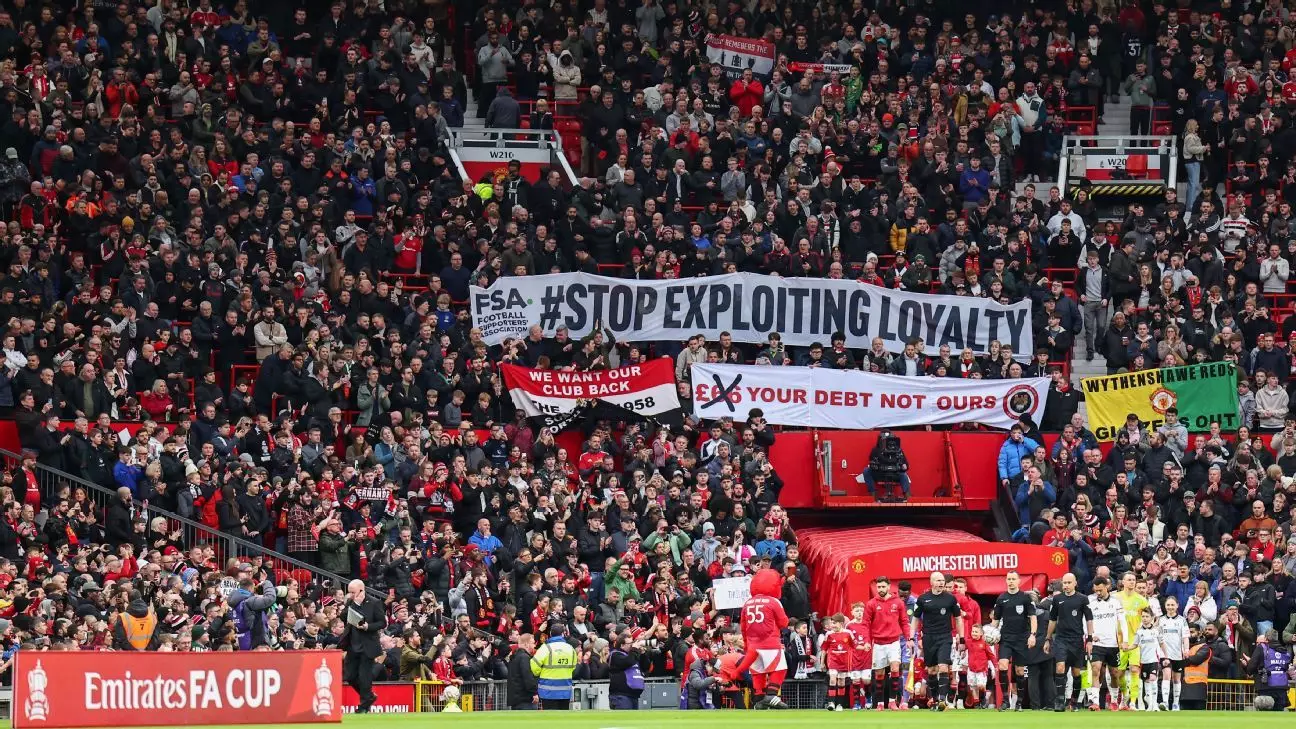In a powerful display of dissent, “The 1958,” one of Manchester United’s foremost supporter groups, has rallied fans to don black attire for the anticipated clash with Arsenal this Sunday at Old Trafford. This symbolic gesture isn’t merely about fashion—it represents a fierce protest against the Glazer family’s grip on the club and their increasingly controversial leadership. With the Premier League season unfolding into a historically dismal performance, fans are growing restless, united by a shared sense of urgency and despair over the institution they cherish.
The overwhelming sentiment among supporters is that Manchester United is being led down a path of financial despair. A troubling financial report disclosed a shocking net loss of $144 million for the 2023-24 financial year, underscoring the precarious economic state in which the club finds itself. The mounting debt and outrageous compensation costs have left many calling for immediate action. To further complicate matters, ongoing debt interest payments have reached £18.8 million in just six months, causing fans to question the sustainability of the current ownership model.
A Legacy at Risk
The Glazer family’s controversial ownership of Manchester United—a_purchase that saddled the club with over £500 million in debt—has been contentious since its inception in 2005. Long before they made their presence felt, supporters expressed outrage over the looming burden of debt that would jeopardize the club’s legacy. The frustration today seems to echo through the decades; many fans feel betrayed by an ownership that seems to prioritize profit over passion.
Steve Crompton, a representative of “The 1958,” articulates a sentiment that many supporters hold: “The club is slowly dying before our eyes.” His assertion highlights an alarming truth that resonates through the hearts of fans. Sir Matt Busby, one of the legendary figures of Manchester United, would be rolling in his grave as the institution he helped build becomes an empty shell of its former glory. To see a revered football giant diminished to such an extent feels like a personal affront, fueling the flames of discontent.
As protests intensify, the club is at a critical juncture. The supporters’ march planned for Sunday serves as a clarion call for unity among fans who have grown weary of the Glazers’ handling of Manchester United. This rally is not just about expressing dissent; it’s also a movement aimed at safeguarding the club’s rich heritage and future. Fans are urged to rise collectively, voicing their condemnation against what they perceive as a systematic dismantling of fan culture at the club.
In tandem with increasing ticket prices—which are now a flat £66, disregarding age or loyalty—many supporters feel that the Glazers have not only ignored their pleas but systematically undermined the value of fan experience. Coupled with layoffs and cost-reductive measures that followed Sir Jim Ratcliffe’s minority share acquisition, supporters are amplifying their collective voice: enough is enough.
While current managerial changes, including the appointment of Ruben Amorim to succeed Erik ten Hag, have failed to turn the tide on the pitch, the challenges facing the club extend far beyond mere player performance. There’s a desperate need for a cultural shift that reinstates the club’s identity as not just a business entity but as a community rooted in shared passion and loyalty. The resistance led by “The 1958” signifies a new chapter in an ongoing struggle—a struggle rooted in history but invigorated by 21st-century economic realities.
As Manchester United’s faithful prepare for this upcoming showdown, they do so with a heightened sense of purpose. The event presents a crucial opportunity for expression, not just against the Glazers but for a larger, collective aspiration to reclaim the club from the clutches of financial mismanagement. The future of Manchester United is not solely dependent on the pitch; it rests in the hands of its devoted supporters who refuse to allow their beloved club to devolve into a “laughing stock,” as so poignantly stated by fans themselves.
While the path ahead remains fraught with challenges, the spirit of unity among supporters promises to breathe life into a cause that extends beyond the game itself. The black worn on Sunday will symbolize not just protest but the resilience and solidarity of a fanbase determined to safeguard the essence of Manchester United for generations to come.


Leave a Reply